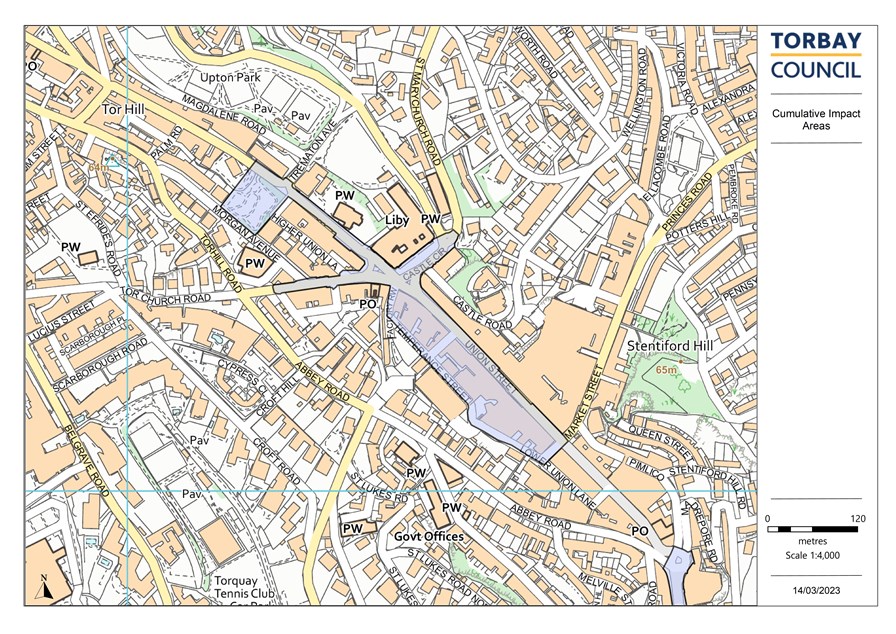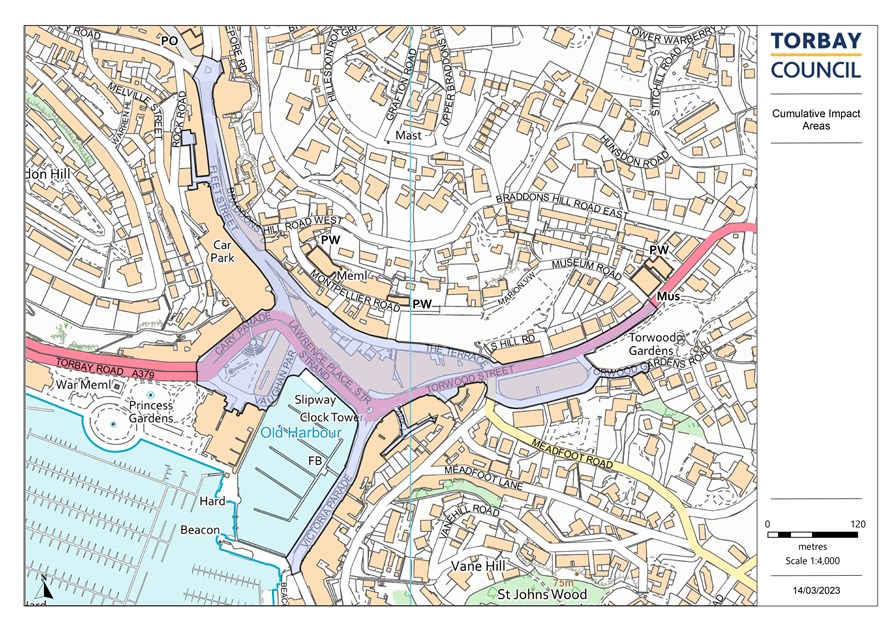Background
Cumulative Impact has been used as a term to describe the stress that a large number of licensed premises can have on crime and disorder, nuisance and the demand on local services. The guidance describes cumulative impact as ‘the potential impact on the promotion of the licensing objectives of a number of licensed premises concentrated in one area’. It is often not that licensed premises on their own are operating in a way that is detrimental to the licensing objectives, but it is the accumulation of the premises and the people attending them that creates the increased problems and demands on services.
Cumulative impact can occur either in the area where the premises are located or some distance away from them, for example at public transport locations or fast food premises. The issue of cumulative impact occurs due to the number of people in the area frequenting the licensed premises. The accumulation of licensed premises has a disproportionate demand on local services such as transport, public lavatories, waste collection and street cleaning. There is also a higher level of crime and disorder, often associated with alcohol-related violence that can take place which will create additional demands on the Police as well as the ambulance service. It is also likely that criminal activity is attracted to areas where there are higher concentrations of people and who may be vulnerable to theft or other crimes due to the level of intoxication.
The problems associated with cumulative impact cannot be attributed to individual premises, and to mismanagement by individual licensees, and so a collective restraint is required.
Until 6 April 2018, ‘cumulative impact’ and ‘cumulative impact policies’ were not a statutory requirement under the Act. Prior to this date, ‘cumulative impact’ was only referred to within the statutory guidance issued by the Home Office.
The government amended the Licensing Act 2003 via the Policing and Crime Act 2017. This amendment made it a requirement that the Licensing Authority must produce a Cumulative Impact Assessment (CIA) if the authority can evidence that there is a cumulative impact within its area. The Licensing Authority must consult on its intention to publish the CIA. The aim of the CIA is to limit the growth of licensed premises where the promotion of the licensing objectives is being compromised. The Council will classify these areas or zones and have a Cumulative Impact Policy that will set out its approach to determining applications that are located within these areas or zones.
In CIA’s, there is a presumption that the licensing authority will refuse or impose limitations on applications which are likely to add to the cumulative impact unless the applicant can demonstrate that there will be no negative cumulative impact on the licensing objectives.
The publication of a CIA does not change how the licensing decisions are made. The Licensing Authority will always consider each application on its merits. However, a CIA is a strong statement of intent about an authority’s approach to licence applications.
Torbay Council has had a Cumulative Impact Policy since 2005 and has continued to review the cumulative impact of licensed premises.
Section 5A of the Licensing Act 2003, which was introduced in 2018, requires the CIA to be reviewed every three years to consider whether it remains of that opinion. From 2021, the CIA has been published separately to the Licensing Policy. Guidance under s.182 of the Licensing Act 2003, describes ‘cumulative impact’ as the potential impact on the promotion of the licensing objectives of a number of licensed premises concentrated in one area. The cumulative impact of licensed premises on the promotion of the licensing objectives is a proper matter for a Licensing Authority to consider in developing its licensing policy statement.
There must be an evidential basis for the decision to adopt/maintain a CIA regarding cumulative impact areas.
The Cumulative Impact Areas
The two areas on the attached plans on page four and five of this report, are areas that were identified by Devon and Cornwall Police and Environmental Health as being subject to high levels of alcohol related crime or public nuisance. The evidence satisfies the Licensing Authority that the number of existing relevant licences in respect of premises in one or more of the areas (shown on the attached plans) are such that it is likely that it would be inconsistent with the Authority’s duty to promote the licensing objectives to grant any further relevant licences in respect of premises in those areas due to crime and disorder and/or public nuisance. Therefore, the Licensing Authority remains of the opinion that the CIA is appropriate for the two existing areas. The evidence that was considered as part of the review of the assessment is contained in Appendices A and B. The information was considered by Cabinet on the 21 November 2023 and Full Council on the 7 December 2023.
Within any CIA area, any licence application will have the ability to either improve or add to any problems experienced by an area with a high density of licensed premises.
Any licensed premises is within the scope of this cumulative impact policy, meaning:
- Sale of alcohol either on or off the premises
- Provision of regulated entertainment
- Provision of late-night refreshment (sale of hot food between 11pm and 5am)
The effect of this assessment is to create a rebuttable presumption that applications for a new premises licence or club premises certificate or the variation of an existing licence or certificate in these areas will normally be refused where:
- Representations have been received and it is anticipated that the application will add to the problems of crime and disorder or/and public nuisance in these areas.
- The applicant has been unable to demonstrate that, within their operating schedule, there will be no significant negative cumulative impact on one or more of the Licensing objectives.
It is recognised that pubs, nightclubs, restaurants, hotels, theatres, and other clubs all sell alcohol, serve food and provide entertainment, but with contrasting styles and characteristics. Proper regard will be made to those differences and the impact they are likely to have on the local community where the amenity of local residents is being placed under severe pressure. The Licensing Authority will consider the locality and local trading environment when assessing applications. For example, while a large nightclub or high-capacity public house might add to problems, a small restaurant or theatre may not.
Examples of where applications may not have a significant negative impact include:
- Direct replacement for similar licences where impact will be similar or less
- Substitution of activities where the impact will be similar or less
- Replace vertical drinking with seated consumption
- Alcohol is ancillary to other activities or services
- Time limited applications, e.g. events
- Phased closing times for the premises to cause gradual dispersal
- Small maximum occupancies
In order for this Policy to be utilised it will still be necessary for responsible authorities or other persons to make relevant representations. Anyone making a representation may base it on the evidence published in the CIA, or the fact that a CIA has been published.
It remains the duty on all responsible authorities and other persons to ensure that their representations can withstand the scrutiny to which they would be subject as a hearing. In other words, it would not be sufficient to say that the licence should be refused just because a CIA is in place, the representation must still say how the application would impact on the licensing objectives. If there are no representations the licensing authority must grant the application in terms that are consistent with the operating schedule submitted.
This CIA is to be read in conjunction with Torbay Council’s Licensing Policy and will be subject to review every three years in accordance with the Licensing Act 2003. If, during any review it is clear that the original concerns regarding crime and disorder and public nuisance are no longer present, the CIA may be amended or removed.
Castle Circus Cumulative Impact Assessment Boundary
Ratified by Full Council on 3 December 2020

Reviewed and approved by Full Council on 7 December 2023
The Strand Cumulative Impact Assessment Boundary
Ratified by Full Council on 3 December 2020

Reviewed and approved by Full Council on 7 December 2023